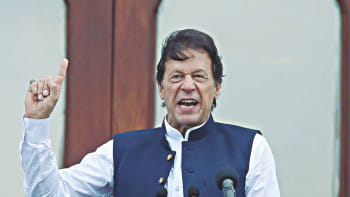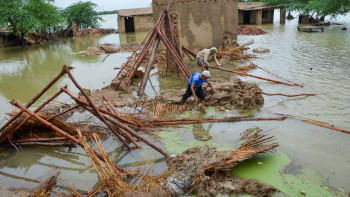The stakes could not be higher for Imran Khan, the establishment and Pakistan

"Chaos isn't a pit. Chaos is a ladder," says Littlefinger, in the global hit television series Game of Thrones. In his conversation with Lord Varys, the Master of Whisperers who is also known as the Spider, Littlefinger concludes by saying, "Many who try to climb it fail and never get to try again."
Chaos is unfolding in the Islamic Republic of Pakistan. It has been for many years.
In fact, some may argue that chaos has been a constant since Pakistan's birth, starting with the assassination of the country's first prime minister, Liaquat Ali Khan. The chaos has engulfed many, including the likes of the first prime minister himself, Zulfikar Ali Bhutto, Ziaul Haq, and most recently, Benazir Bhutto.
Imran Khan, the authoritarian populist who has found a way to channel the rage of millions of citizens, is the most recent leader trying to climb the ladder of chaos.
And he nearly failed.
Thursday's assassination attempt on the former prime minister, who has been on the campaign trail since his ousting in the country's first-ever vote of no confidence in Parliament, is only going to stoke more mayhem.
With sharp lines already drawn not just across the political spectrum, but much of society, the stakes could not have been higher. What has been the most serious threat to national cohesion since 1971, something that this author has been warning about since the vote of no confidence, has only become more dangerous.
Khan has survived, for now, and will live to fight another day. This brush with death will only reinforce Khan's belief that he is on this earth for a purpose – to vanquish the corrupt mafias that have drained his beloved country of all the potential and riches that it has to offer.
A born-again Muslim, Khan is fundamentally guided by this mission, which he sees as a fight between good and evil. Anyone and everyone who is opposed to this mission is on the side of evil. This belief will only be reinforced by this second brush with death (Imran sustained serious injuries while climbing a stage at a rally in Lahore in 2013).
But this chaos is not only being stoked by Khan. In fact, he is a creation of the powers that have harnessed chaos for decades. And it is just an ironic twist of fate that the bearers of the powers have created a being that is more powerful than them, at least for the time being.

And it is for this reason that this most recent escalation is so serious. For both Khan and his creators realise that to make one or the other fail, the ladder of chaos must be made that much more dangerous, such that only one of them survives.
Meanwhile, those politically opposed to Khan are yearning for his former benefactors to bring him down – and staring at irrelevance should this plan fail. They cannot, at least for the foreseeable future, compete with Khan. They have no ability, no capacity, and no narrative with which to weaken their mortal enemy.
Many will argue that this is not true. After all, they would say, Khan is only seeking the support of his former benefactors to bring about the revolution that he is seeking. But these folks miss the clear signal that was delivered in that unprecedented press conference: the current leadership of the army, which has decided to remain apolitical, is going to be around for at least the next 15 years.
This means that the only way for Khan to achieve his goals is to force his former allies and benefactors to bend the knee in submission. And if Pakistan's history is any guide, forcing the country's powerful military establishment to bend the knee in submission, that too to a civilian, is easier said than done.
And so, the raging storms that have engulfed the Islamic Republic are only going to get worse in the coming days and months. As a result, a society that has been pummelled by sky-high inflation, unprecedented floods, a stagnant economy, and malnutrition, is only going to be further devastated. Citizens and their well-being are not even an afterthought in this cynical Game of Thrones and with every passing day, they will be worse off.
Pakistan's external allies, particularly the ones on whose charity the country barely makes ends meet, will be watching with disdain. They have had delegation upon delegation of elites come to their doors, seeking a bailout. For these external benefactors, it is simply bad strategy to shore up the country's economy, for they do not know who will and who will not survive.
So long as Pakistan's elites believe that chaos is a ladder that they climb and stay atop, the continuous cycle of instability will continue. What will change, however, is the standard of living of current and future generations. And these standards will go anywhere but up.
This article was first published in Dawn, an Asia News Network partner of The Daily Star.
Uzair M Younus is the director of the Pakistan Initiative at the Atlantic Council's South Asia Center and host of the podcast Pakistonomy.

 For all latest news, follow The Daily Star's Google News channel.
For all latest news, follow The Daily Star's Google News channel. 







Comments